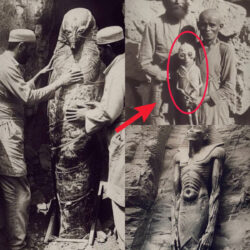
A medieval mummy known for her “Adidas” boots, which she wore more than a millennium ago, has been revealed in intriguing new details. The body of the lady was found a year prior this week in the Altai mountains locale of Mongolia.
Furthermore, her body and assets remained so surprisingly safeguarded that specialists are as yet revealing a portion of the mysteries they keep. Now, researchers have found that the mummy died after receiving a significant head blow.
In April 2016, the Mongolian woman, who was between the ages of 30 and 40, made headlines for her sleek footwear, which some compared to a pair of trainers. Scientists have been trying to learn more about the enigmatic Mongolian mummy over the past year.

New photographs that were published today by The Siberian Times show that her recognizable felt boots, which feature red and black stripes, have been meticulously cleaned. Specialists from the Focal point of Social Legacy of Mongolia presently accept the lady passed on as long as quite a while back in the wake of experiencing a serious head wound.
Starting assessments found that ‘it was very conceivable that the hints of a disaster for the mummy’s facial bones were the reason for her demise.
They don’t yet know for sure when the burial took place, but they think it was in the tenth century, which is earlier than originally thought. The Center’s director, Galbadrakh Enkhbat, commented on the boots: ‘With these stripes, when the find was unveiled, they were named like Adidas shoes.

“In this sense, they are an interesting subject for ethnographers to study,” says the author, “especially when the style is very modern.”
Furthermore, one neighborhood design master. said, as reported by Siberian Times: They have a rather kinky but stylish overall appearance, and I wouldn’t mind wearing them now in a cold climate.
“Those high-quality stitches, the length, the bright red and black stripes, and I would buy them right now in a flash.”
The high height and cold environment assisted with saving both the lady’s body and her assets.
Additionally, this process was aided by the covering of Shilajit, a thick, sticky, tar-like substance that ranged in color from white to dark brown. On her felt-wrapped remains, there is evidence of hair and skin. Along with the woman, several of her belongings, including a handbag and four outfits, were buried.



A knife, a comb, and a mirror from her beauty kit were also discovered. Also buried were her horse and a saddle with metal stirrups in such good condition that it could still be used today. Archaeologists, on the other hand, believe that she was “an ordinary woman of her time, rather than an aristocrat or royal,” despite the fact that she appears to have a lot of money.



According to what was discovered within the burial, Mr. Enkhbat continued, “We assume that she was from a normal social strata.”
Several sewing tools were discovered with her.


“We think she could have been a seamstress. This is just our guess,” the author asserts.
We can be certain that the embroidery was done by locals because it was on both the bag and the shoes, and the sewing kit was in her bag.
The woman’s grave was found at an elevation of 9,200 feet (2,803 meters), and it is thought that she was Turkik. It appears to be the first Turkic burial in Central Asia that is complete. At the hour of the revelation, analysts on Twitter and Facebook made various flippant cases that a lady should be a person who goes back and forth through time.
One Twitter user made a sarcastic comment, ” You must be able to travel through time. Another added, “I knew we would find one sooner or later.” Huh? Time-traveling Mummy? Was the corpse tampered with?
In the mean time, Facebook clients said: ‘ “Well, I must admit, I have a few pair but I ain’t had them that long,” he said, laughing, “he’s wearing a pair of gazelles.”
The grave contained numerous belongings that provide a unique perspective on life in medieval Mongolia. These incorporated a seat, harness, earth jar, wooden bowl, box, iron pot, the remaining parts of a whole pony, and old dress.

There were likewise cushions, a sheep’s head and a felt satchel in which were set the entire back of a sheep, goat bones and a little cowhide sack intended to convey a cup. Local herdsmen notified archaeologists from the Khovd city museum of the burial site.
The Altai Mountains – where the entombment was found – join Siberia, in Russia, and Mongolia, China and Kazakhstan.





